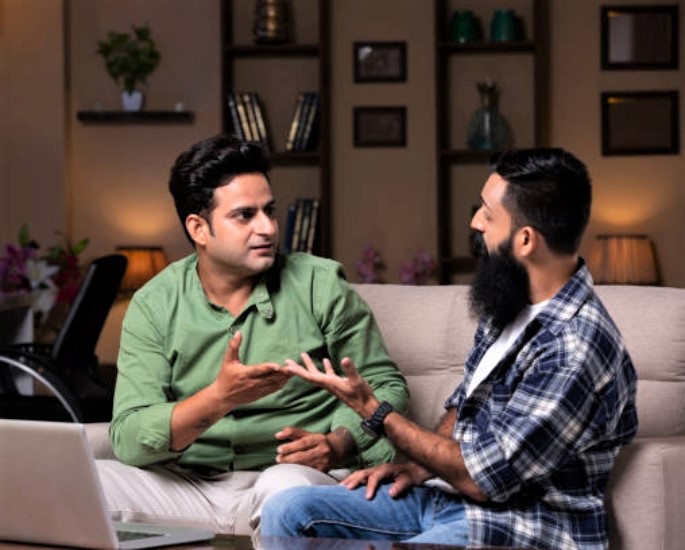"They still don’t understand why I go to therapy"
Mental health is something that affects most people at some point in their life. Both positive and negative moods can often be a sign of the state of your mental health.
Happiness, optimism, and good self-esteem are some of the many indicators of positive mental health.
While sadness, mood swings and irritability are indicators of negative mental health.
However, there are issues within the South Asian community where the importance of mental health is overlooked.
Mind, a popular mental health charity has revealed that one in four people struggle with their mental health, demonstrating the severity of this issue.
Poor mental health can have detrimental consequences such as depression, self-harm and suicide. It is important to recognise the signs and seek help.
However, seeking help for a pain that is not physical can often be tough. According to the NHS, only 2,195 per 100,000 South Asian people access NHS mental health services
It’s not that South Asians are immune to poor mental health. It’s simply that it’s heavily stigmatised and therefore a difficult discussion to have.
Many South Asians that immigrated to the UK suffer from serious undiagnosed mental health issues which they then reflect on their children.
Their exposure to the world of work, poverty, hardships, racism, and family battles all make the world a difficult place for them.
Unknowingly many of these parents project their difficulty and go on to traumatise their children. But, how prominent is this within Desi families?
Marriage & Mental Health

At DESIblitz our mission behind these interviews is to process why mental health is a difficult conversation and what Desi people think of mental wellbeing.
Parveen Malik* a first-generation Desi immigrant describes her marriage when moving to the UK and how this environment later affected her daughter:
“I came here with my husband before there was so much progression. I couldn’t speak the language and was heavily dependent on my husband for money and everything.
“But, I don’t think it took a toll on me. These days kids exaggerate everything. They don’t have what it takes to make a relationship last.
“We fight like every other couple. He forgets to bring the groceries home, so we fight. He forgets to put his dish away, so we fight and he annoys me, so we fight.
“I cry. He cries. We break a few things. It’s normal.
“We were away from Pakistan and all that we’d known. So, we could only be mad at each other. Everyone has a stressful life. Get over it.
“Fighting in a marriage is normal. We can’t be happy all day everyday.”
According to Parveen, people no longer have the patience to tolerate one another’s flaws within a marriage. For her, this is a setback rather than a progression.
The lack of tolerance means that normal fights are heightened and then eventually break down.
For her, marriage isn’t a smooth sailing boat. The fighting isn’t about mental health, it’s just part and parcel of any marriage.
We spoke to her daughter, Samiyah Malik* about her experience of growing up in a household where fighting is normalised. She says:
“They made me hate life. I still do in a way.
“For a long while, I was depressed. I was having a hard time processing my home environment. My parents would fight all the time and it was always almost about money.”
Many parents find it difficult to understand why their children have a hard time.
To them, any disagreements are between them and their spouse. They do not see their children as part of the equation. This is where the problem lies as Samiyah continues:
“It was draining to be in that household. I don’t know why two clearly incompatible people are choosing to stay married. They make their life hell and make it worse for their kids.
“I resent them so much because what they’ve given me is a lifetime of trauma.”
“I didn’t go to therapy till I was 26. They still don’t understand why I go to therapy.
“I’m glad I decided to go to therapy. It’s the only reason I’m breathing right now and having this conversation. They just don’t get it.”
While Parveen has seen no issues with her household, Samiyah sees and absorbs everything.
Her mental deterioration has led to suicidal thoughts. Clearly, just because the parents don’t see it as a problem does not mean there isn’t a problem.
Seeking help and knowing you need help is a crucial step in recovering.
A very different experience is shared by Antara Bhatt*, a second-generation Desi woman:
“Getting a divorce was shunned in my time. I still did it. I had to do what was best for myself and my daughter. My mental health was the best it had ever been since the divorce.
“Everyone told me your daughter needs to grow up with stability that only a married couple can give. What marital stability did domestic abuse bring?”
Society and especially the Desi community have a lot to say about the lives of women. A woman getting divorced is still seen as taboo.
No one sees the reason for the divorce. They hear the word, and they already have opinions formed.
Domestic violence is overlooked in many South Asian marriages. Many do choose to continue to live that life for the sake of their children.
The idea that a child can only grow up well in a nuclear family is very much still instilled. Antara carries on to explain:
“I am not okay with my daughter learning that her father abusing her mother is normal. Just because Desi’s have a tendency to normalise these things does not make it normal.
“I am too progressive for my mother. But I am a mother that will put herself first and will still raise her daughter with a head high.
“I did not do the walk of shame. I tell my daughter I did the walk of liberation.”
Understanding self-worth and knowing when to put yourself first is often seen as an effect of modernisation.
Putting up with traumatic experiences and damaging your mental health to put up with societal standards is less talked about within communities.
But it is praiseworthy and takes a lot of sabr (patience).
Antara’s daughter, Maya Bhatt* shares her take on her parent’s divorce and the mental health impacts:
“Growing up I struggled to come to terms with the fact that I went from having a present father to an absent father.
“I knew my mother was struggling. My father was a scary and abusive husband. But he was a loving father.
“I missed that and resented my mother sometimes.
“But now that I am older, I am grateful she put herself first. There was no way I would have grown up happy seeing my mother bruised and beaten.
“It really would have f****d up my life. She fought against the world for us.
“She puts my mental health ahead of anything. We have a regular mental health meeting every month.
“It’s weird but it’s our way of communicating and checking up on each other. She’s the best person in my life.”
For Maya, growing older and more aware of her mother’s marriage has made their relationship stronger.
She understands that she grew up in a healthy environment because her mother chose to stand against societal norms.
Breaking boundaries and expectations are never easy but there is a reward in doing so.
Whilst marriages can have a serious impact on mental health, more conversations and openness proves to have a positive effect on children and their mindset.
Understanding Mental Health in Desi Families

For some people, education is not what teaches them about the seriousness of mental health. It is an experience, it is a loss, it is regret.
Anand Buri*, a first-generation Desi shares a heartbreaking story of his:
“There is not a lot I regret in life. But the only thing I did and do regret has cost me everything.
“My son came to me some years back and he was trying to tell me he was struggling. I did not take it seriously. I laughed it off when he said he was depressed.
“What was there to be depressed of? He had a good job, a good wife and obedient children. I was wrong.
“Mental health is much more complicated. I didn’t take him seriously and I paid the price.
“You see, I was never taught about mental health. I was taught to just deal with any hardship. When my son took his life, my world collapsed.
“He came to me and said ‘Papa, I feel helpless. Papa, I feel depressed. And Papa let him down, Papa said what is there to be depressed about?”
Anand’s story is not easy to absorb and highlights the traditional mindset that you should just ‘get on with it’.
However, not everyone can deal with their situation or mental health in this way.
When someone seeks out help, it is necessary to give it. If you don’t know how to, at least directing them towards someone who will be helpful is important.
Anand was to not know what would happen in this situation. But the lifetime of regret is there because mental health was downplayed in his generation.
Furqan Raheem*, a third-generation Desi shares his experience of dealing with mental health and suicidal thoughts:
“I am struggling. I know I am. But it is embarrassing to own up to my wife, kids and parents that I feel lost and drained.
“I don’t have much of me left. My parents will think I am crazy.”
A lot of the time seeking help is harder than realising they need the help. Realising help is needed is one of the many obstacles along the path for a Desi person.
They first must consider what will people think as there is still a lot of judgement and misconceptions placed upon those who come forward about their mental health:
“I don’t want to go to therapy. Therapists don’t understand brown people’s problems. I’ll tell them I am struggling with my marriage. They’ll tell me to get a divorce.”
Furqan raises a very important issue. The lack of inclusivity within the therapy industry.
This can often be a deterring factor for many South Asians who just want to have relatable therapy sessions:
“They just don’t understand brown people.
“I don’t want my kids knowing their father hates life and responsibilities. I don’t want them to think I made a mistake in having them, that they added to my burden.”
Struggling with mental health all the while balancing fragile relationships, especially ones with children is difficult. It often means their mental health is sacrificed so their children don’t have to.
Moreover, Beena Khan* shares her relationship dynamic with her father.
Whilst her father refused to discuss it with DESIblitz, Beena wanted to share her experience so others could take strength from it:
“My relationship with my father is complex. I have tried to explain to him that I was on depression tablets because I couldn’t deal with our home environment.
“He thinks providing us with a roof over our head and food in our stomach is all there is to parenting. What about love and affection?
“He was an absent father for most of it. I get it, money doesn’t grow on trees. But why did he choose to have me if he couldn’t provide me with emotional security?
“We’ve had many fights about this. He still doesn’t acknowledge the hand he had in my depression. To him, I’m just a sensitive girl.”
Being sensitive can often be presented as a negative trait. Being in touch with your emotions and expressing your need for affection is never wrong.
While it is important to have a roof over your head, it is just as important to be physically present.
These accounts of mental health show that Desi immigrants were raised with one outlook on mental health. In some situations, it is downplayed which has an adverse effect on their children.
Other scenarios emphasise that acknowledging the importance of mental health can have a more positive outcome for a family.
The outdated idea to move past mental health or overlooking how serious it can be can have massive repercussions for South Asian families.
But fortunately, more resources are available to South Asians who require support.
Likewise, there are wider discussions about realising how vital it is to be open and honest with children, elders and friends.
If you or know someone who is struggling with their mental health, do not stay silent and reach out. Some helpful sites include:






























































